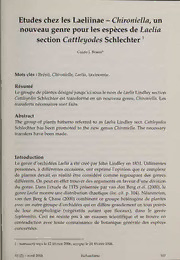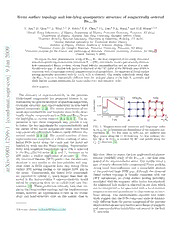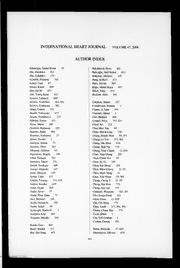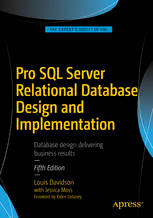
Pro SQL Server Relational Database Design and Implementation PDF
Preview Pro SQL Server Relational Database Design and Implementation
THE EXPERT’S VOICE® IN SQL Pro SQL Server Relational Database Design and Implementation Database design delivering business results — Fifth Edition — Louis Davidson with Jessica Moss Foreword by Kalen Delaney Pro SQL Server Relational Database Design and Implementation Fifth Edition Louis Davidson with Jessica Moss Foreword by Kalen Delaney Pro SQL Server Relational Database Design and Implementation Louis Davidson Jessica Moss Antioch, Tennessee Mechanicsville, Virginia USA USA ISBN-13 (pbk): 978-1-4842-1972-0 ISBN-13 (electronic): 978-1-4842-1973-7 DOI 10.1007/978-1-4842-1973-7 Library of Congress Control Number: 2016963113 Copyright © 2016 by Louis Davidson This work is subject to copyright. All rights are reserved by the Publisher, whether the whole or part of the material is concerned, specifically the rights of translation, reprinting, reuse of illustrations, recitation, broadcasting, reproduction on microfilms or in any other physical way, and transmission or information storage and retrieval, electronic adaptation, computer software, or by similar or dissimilar methodology now known or hereafter developed. Trademarked names, logos, and images may appear in this book. Rather than use a trademark symbol with every occurrence of a trademarked name, logo, or image we use the names, logos, and images only in an editorial fashion and to the benefit of the trademark owner, with no intention of infringement of the trademark. The use in this publication of trade names, trademarks, service marks, and similar terms, even if they are not identified as such, is not to be taken as an expression of opinion as to whether or not they are subject to proprietary rights. Managing Director: Welmoed Spahr Lead Editor: Jonathan Gennick Development Editor: Laura Berendson Technical Reviewers: Rodney Landrum, Arun Pande, Andy Yun, Alexzander Nepomnjashiy Editorial Board: Steve Anglin, Pramila Balan, Laura Berendson, Aaron Black, Louise Corrigan, Jonathan Gennick, Todd Green, Robert Hutchinson, Celestin Suresh John, Nikhil Karkal, James Markham, Susan McDermott, Matthew Moodie, Natalie Pao, Gwenan Spearing Coordinating Editor: Jill Balzano Copy Editor: Bill McManus Compositor: SPi Global Indexer: SPi Global Artist: SPi Global Distributed to the book trade worldwide by Springer Science+Business Media New York, 233 Spring Street, 6th Floor, New York, NY 10013. Phone 1-800-SPRINGER, fax (201) 348-4505, e-mail orders-ny@springer-sbm.com, or visit www.springer.com. Apress Media, LLC is a California LLC and the sole member (owner) is Springer Science + Business Media Finance Inc (SSBM Finance Inc). SSBM Finance Inc is a Delaware corporation. For information on translations, please e-mail rights@apress.com, or visit www.apress.com. Apress and friends of ED books may be purchased in bulk for academic, corporate, or promotional use. eBook versions and licenses are also available for most titles. For more information, reference our Special Bulk Sales–eBook Licensing web page at www.apress.com/bulk-sales. Any source code or other supplementary materials referenced by the author in this text are available to readers at www.apress.com. For detailed information about how to locate your book’s source code, go to www.apress.com/source-code/. Readers can also access source code at SpringerLink in the Supplementary Material section for each chapter. Printed on acid-free paper This book is dedicated to my mom, who passed away just after Thanksgiving in 2013. She had no idea what SQL was really, but was always encouraging and very proud of me as I was of her. —Louis Contents at a Glance Foreword ����������������������������������������������������������������������������������������������������������������xix About the Authors ���������������������������������������������������������������������������������������������������xxi About the Technical Reviewers ����������������������������������������������������������������������������xxiii Acknowledgments �������������������������������������������������������������������������������������������������xxv Introduction ���������������������������������������������������������������������������������������������������������xxvii ■ Chapter 1: The Fundamentals ��������������������������������������������������������������������������������1 ■ Chapter 2: Introduction to Requirements ������������������������������������������������������������41 ■ Chapter 3: The Language of Data Modeling ���������������������������������������������������������57 ■ Chapter 4: Conceptual and Logical Data Model Production ��������������������������������97 ■ Chapter 5: Normalization �����������������������������������������������������������������������������������141 ■ Chapter 6: Physical Model Implementation Case Study ������������������������������������185 ■ Chapter 7: Expanding Data Protection with Check Constraints and Triggers����271 ■ Chapter 8: Patterns and Anti-Patterns ��������������������������������������������������������������321 ■ Chapter 9: Database Security and Security Patterns ����������������������������������������411 ■ Chapter 10: Index Structures and Application ��������������������������������������������������491 ■ Chapter 11: Matters of Concurrency �����������������������������������������������������������������559 ■ Chapter 12: Reusable Standard Database Components ������������������������������������627 ■ Chapter 13: Architecting Your System ��������������������������������������������������������������657 ■ Chapter 14: Reporting Design ����������������������������������������������������������������������������705 ■ Appendix A: Scalar Datatype Reference ������������������������������������������������������������745 Index ���������������������������������������������������������������������������������������������������������������������779 v Contents Foreword ����������������������������������������������������������������������������������������������������������������xix About the Authors ���������������������������������������������������������������������������������������������������xxi About the Technical Reviewers ����������������������������������������������������������������������������xxiii Acknowledgments �������������������������������������������������������������������������������������������������xxv Introduction ���������������������������������������������������������������������������������������������������������xxvii ■ Chapter 1: The Fundamentals ��������������������������������������������������������������������������������1 Taking a Brief Jaunt Through History �������������������������������������������������������������������������������2 Introducing Codd’s Rules for an RDBMS�������������������������������������������������������������������������������������������������3 Nodding at SQL Standards ����������������������������������������������������������������������������������������������������������������������8 Recognizing Relational Data Structures ���������������������������������������������������������������������������9 Introducing Databases and Schemas ���������������������������������������������������������������������������������������������������10 Understanding Tables, Rows, and Columns ������������������������������������������������������������������������������������������10 Working with Missing Values (NULLs) ��������������������������������������������������������������������������������������������������15 Defining Domains ���������������������������������������������������������������������������������������������������������������������������������17 Storing Metadata ����������������������������������������������������������������������������������������������������������������������������������18 Defining Uniqueness Constraints (Keys) �����������������������������������������������������������������������������������������������19 Understanding Relationships ����������������������������������������������������������������������������������������25 Working with Binary Relationships �������������������������������������������������������������������������������������������������������27 Working with Nonbinary Relationships �������������������������������������������������������������������������������������������������31 Understanding Functional Dependencies �����������������������������������������������������������������������32 Understanding Functional Dependencies ���������������������������������������������������������������������������������������������32 Finding Determinants ���������������������������������������������������������������������������������������������������������������������������33 vii ■ Contents Relational Programming �������������������������������������������������������������������������������������������������33 Outlining the Database-Specific Project Phases ������������������������������������������������������������34 Conceptual Phase ���������������������������������������������������������������������������������������������������������������������������������36 Logical Phase ���������������������������������������������������������������������������������������������������������������������������������������36 Physical �����������������������������������������������������������������������������������������������������������������������������������������������37 Engine Adjustment Phase ���������������������������������������������������������������������������������������������������������������������37 Summary ������������������������������������������������������������������������������������������������������������������������38 ■ Chapter 2: Introduction to Requirements ������������������������������������������������������������41 Documenting Requirements �������������������������������������������������������������������������������������������43 Gathering Requirements ������������������������������������������������������������������������������������������������45 Interviewing Clients ������������������������������������������������������������������������������������������������������������������������������46 Asking the Right Questions�������������������������������������������������������������������������������������������������������������������47 Utilizing Other Types of Documentation �������������������������������������������������������������������������52 Early Project Documentation ����������������������������������������������������������������������������������������������������������������53 Contracts or Client Work Orders �����������������������������������������������������������������������������������������������������������53 Level of Service Agreement ������������������������������������������������������������������������������������������������������������������53 Audit Plans ��������������������������������������������������������������������������������������������������������������������������������������������53 Prototypes ��������������������������������������������������������������������������������������������������������������������������������������������54 Following Best Practices ������������������������������������������������������������������������������������������������54 Summary ������������������������������������������������������������������������������������������������������������������������54 ■ Chapter 3: The Language of Data Modeling ���������������������������������������������������������57 Introducing Data Modeling ���������������������������������������������������������������������������������������������58 Entities ���������������������������������������������������������������������������������������������������������������������������59 Attributes ������������������������������������������������������������������������������������������������������������������������62 Primary Keys ����������������������������������������������������������������������������������������������������������������������������������������64 Alternate Keys ��������������������������������������������������������������������������������������������������������������������������������������66 Foreign Keys ����������������������������������������������������������������������������������������������������������������������������������������68 Domains ������������������������������������������������������������������������������������������������������������������������������������������������69 viii ■ Contents Relationships ������������������������������������������������������������������������������������������������������������������72 Identifying Relationships ����������������������������������������������������������������������������������������������������������������������73 Nonidentifying Relationships ����������������������������������������������������������������������������������������������������������������74 Role Names ������������������������������������������������������������������������������������������������������������������������������������������76 Relationship Cardinality ������������������������������������������������������������������������������������������������������������������������78 Verb Phrases (Relationship Names) ������������������������������������������������������������������������������������������������������86 Descriptive Information ��������������������������������������������������������������������������������������������������88 Alternative Modeling Methodologies ������������������������������������������������������������������������������90 Information Engineering �����������������������������������������������������������������������������������������������������������������������90 Chen ERD ����������������������������������������������������������������������������������������������������������������������������������������������92 Best Practices ����������������������������������������������������������������������������������������������������������������94 Summary ������������������������������������������������������������������������������������������������������������������������94 ■ Chapter 4: Conceptual and Logical Data Model Production ��������������������������������97 Example Scenario �����������������������������������������������������������������������������������������������������������99 Building the Conceptual Model ��������������������������������������������������������������������������������������99 Identifying Entities ������������������������������������������������������������������������������������������������������������������������������100 Identifying Relationships Between Entities ����������������������������������������������������������������������������������������109 Testing the Conceptual Model ������������������������������������������������������������������������������������������������������������119 Building the Logical Model �������������������������������������������������������������������������������������������120 Identifying Attributes and Domains ����������������������������������������������������������������������������������������������������120 Identifying Business Rules �����������������������������������������������������������������������������������������������������������������132 Identifying Fundamental Processes ���������������������������������������������������������������������������������������������������133 Finalizing the Logical Model ���������������������������������������������������������������������������������������������������������������135 Best Practices ��������������������������������������������������������������������������������������������������������������138 Summary ����������������������������������������������������������������������������������������������������������������������139 ■ Chapter 5: Normalization �����������������������������������������������������������������������������������141 The Process of Normalization ��������������������������������������������������������������������������������������142 Table and Column Shape ���������������������������������������������������������������������������������������������143 All Columns Must Be Atomic ���������������������������������������������������������������������������������������������������������������143 All Rows Must Contain the Same Number of Values ��������������������������������������������������������������������������152 ix ■ Contents All Rows Must Be Different �����������������������������������������������������������������������������������������������������������������155 Clues That an Existing Design Is Not in First Normal Form ����������������������������������������������������������������157 Relationships Between Columns ����������������������������������������������������������������������������������158 BCNF Defined ��������������������������������������������������������������������������������������������������������������������������������������158 Partial Key Dependency ���������������������������������������������������������������������������������������������������������������������160 Entire Key Dependency �����������������������������������������������������������������������������������������������������������������������162 Surrogate Keys Effect on Dependency �����������������������������������������������������������������������������������������������163 Dependency Between Rows ���������������������������������������������������������������������������������������������������������������166 Clues That Your Database Is Not in BCNF �������������������������������������������������������������������������������������������167 Positional Meaning �����������������������������������������������������������������������������������������������������������������������������170 Tables with Multiple Meanings �������������������������������������������������������������������������������������171 Fourth Normal Form: Independent Multivalued Dependencies ����������������������������������������������������������172 Fifth Normal Form ������������������������������������������������������������������������������������������������������������������������������175 Denormalization �����������������������������������������������������������������������������������������������������������178 Best Practices ��������������������������������������������������������������������������������������������������������������180 Summary ����������������������������������������������������������������������������������������������������������������������181 The Story of the Book So Far ���������������������������������������������������������������������������������������182 ■ Chapter 6: Physical Model Implementation Case Study ������������������������������������185 Choosing a Physical Model for Your Tables �����������������������������������������������������������������189 Choosing Names ����������������������������������������������������������������������������������������������������������191 Table Naming ��������������������������������������������������������������������������������������������������������������������������������������192 Naming Columns �������������������������������������������������������������������������������������������������������������������������������194 Model Name Adjustments �������������������������������������������������������������������������������������������������������������������195 Choosing Key Implementation ��������������������������������������������������������������������������������������197 Primary Key ����������������������������������������������������������������������������������������������������������������������������������������197 Alternate Keys ������������������������������������������������������������������������������������������������������������������������������������202 Determining Domain Implementation ��������������������������������������������������������������������������205 Enforce Domain in the Column, or With a Table? ��������������������������������������������������������������������������������207 Choosing the Datatype������������������������������������������������������������������������������������������������������������������������209 Setting Nullability �������������������������������������������������������������������������������������������������������������������������������219 Choosing the Collation ������������������������������������������������������������������������������������������������������������������������220 x ■ Contents Setting Up Schemas �����������������������������������������������������������������������������������������������������222 Adding Implementation Columns ���������������������������������������������������������������������������������223 Using DDL to Create the Database �������������������������������������������������������������������������������224 Creating the Basic Table Structures ���������������������������������������������������������������������������������������������������227 Adding Uniqueness Constraints ����������������������������������������������������������������������������������������������������������238 Building Default Constraints ���������������������������������������������������������������������������������������������������������������242 Adding Relationships (Foreign Keys) ��������������������������������������������������������������������������������������������������243 Adding Basic Check Constraints ���������������������������������������������������������������������������������������������������������249 Triggers to Maintain Automatic Values �����������������������������������������������������������������������������������������������252 Documenting Your Database �������������������������������������������������������������������������������������������������������������255 Viewing the Basic System Metadata �������������������������������������������������������������������������������������������������259 Unit Testing Your Structures �����������������������������������������������������������������������������������������263 Best Practices ��������������������������������������������������������������������������������������������������������������268 Deployment Lifecycle ���������������������������������������������������������������������������������������������������269 Summary ����������������������������������������������������������������������������������������������������������������������270 ■ Chapter 7: Expanding Data Protection with Check Constraints and Triggers����271 Check Constraints ��������������������������������������������������������������������������������������������������������273 CHECK Constraints Based on Simple Expressions ������������������������������������������������������������������������������279 CHECK Constraints Using Functions ���������������������������������������������������������������������������������������������������281 Enhancing Errors Caused by Constraints��������������������������������������������������������������������������������������������285 DML Triggers ����������������������������������������������������������������������������������������������������������������287 AFTER Triggers ������������������������������������������������������������������������������������������������������������������������������������288 Relationships That Span Databases ���������������������������������������������������������������������������������������������������303 INSTEAD OF Triggers ���������������������������������������������������������������������������������������������������������������������������307 Dealing with Trigger and Constraint Errors �����������������������������������������������������������������313 Best Practices ��������������������������������������������������������������������������������������������������������������319 Summary ����������������������������������������������������������������������������������������������������������������������319 xi
The list of books you might like

As Good as Dead

Believe Me

The Strength In Our Scars

Atomic Habits James Clear

Busardo 2 Anabolic-MS_CN

Genesia Les Chroniques Pourpres 4 La Derniere Prophetesse

Portraiture and Photography in Africa

The God of that Summer
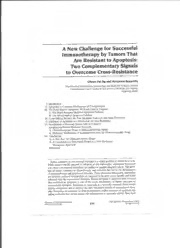
DTIC ADA593709: Regulation of TRAIL-Medicated Apoptosis in Prostate Cancer by Overexpression of XIAP

DTIC ADA450305: Central Asia and Its Asian Neighbors: Security and Commerce at the Crossroads

Insecticidal characteristics of the desert stingbush (Eucnide urens)

Kluftinger 03 - Seegrund

EAS 98: Curry powder – Specification

The Benko gambit
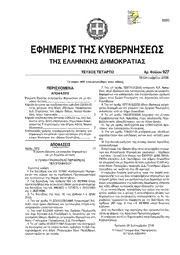
Greek Government Gazette: Part 4, 2006 no. 927

Steve Jobs

Lutheran Education Mar/Apr 1993

DC 1:2012cv00139 complaint attachment 5

Guerra Contra Todos los Puertorriqueños: Revolución y Terror en la Colonia Americana (Spanish Edition)
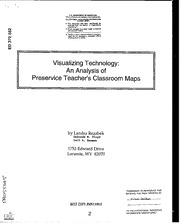
ERIC ED370582: Visualizing Technology: An Analysis of Preservice Teacher's Classroom Maps.

